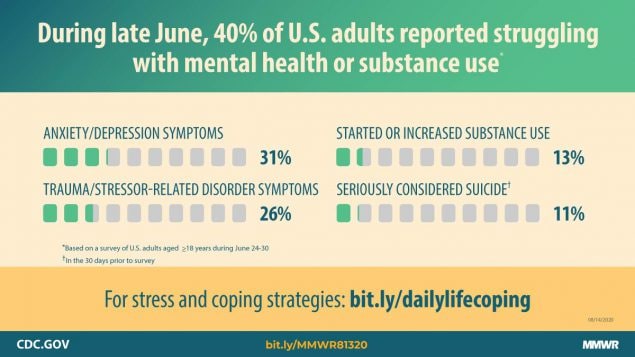Mental Health, Substance Use & Suicidal Ideation: A Parallel Crisis?
While it is too early to have comprehensive data, a new CDC report signals that we are seeing rising rates of depression, substance use and a continued rise in suicides during the Covid-19 epidemic. The CDC report included this infographic:
Several federal bills have been working through Congress to increase the availability of mental health resources. Last week, the FCC voted unanimously to designate 9-8-8 as a nationwide phone number for a mental health crisis and suicide hotline; however, that service will not be fully in place until 2022.
Contact Tracing
Only 14 states currently make their contact tracing data publicly available. The information may include staffing levels, transmission-related data (e.g. locations where transmissions are taking place, success rates for communicating with newly diagnosed and their contacts, etc.), and other metrics. NPR (the author of the piece linked above) has created a map that allows readers to see what states share what information.
Another NPR piece, titled “Contact Tracers In Massachusetts Order Milk And Help With Rent. Here’s Why” describes how that state’s contact tracing system established the position of care resource coordinator as part of their tracing team. As they state in the story:
But making the choice to keep others safe can be hard to do without support. For many, single parents or low-wage workers, for instance, staying in isolation is impractical as they struggle with how to feed the kids or pay the rent….
The collaborative says most client requests are for food, medicine, masks and cleaning supplies. COVID-19 patients who are out of work for weeks or who don’t have salaried jobs may need help with rental assistance — which is available to qualified Massachusetts residents — or applying for unemployment.
Care resource coordinators even connect people with legal support when they need it. An older woman employed in the laundry room at a nursing home was told she wouldn’t be paid while out sick. Schaeffer gets in touch with the Community Tracing Collaborative’s attorney, who reminds the company that paid sick leave is required of most employers during the pandemic.
Late last month, I took part in a Contact Tracing Q&A Webinar with Side Effects Public Media. You can see that event here:
Coronavirus Restrictions By State: Midwest and Nationally
Here is a compendium of Coronavirus policies put in place by midwestern states, updated through the end of last week. At the bottom of the page, you can find links to other regions of the country.
Business Insurance & Covid-19-related Losses
A federal judge in Missouri ruled in favor of businesses that sought to sue their insurance carrier to recoup losses they suffered when their businesses were interrupted by the pandemic. Two similar cases filed in other jurisdictions ruled in favor of the insurance carriers. According to the reporter:
Business owners have filed hundreds of lawsuits claiming that their business interruption insurance, which typically offers coverage for losses from calamities such as fires or floods, should also cover a pandemic.
Insurers have countered that applying such coverage to COVID-19 losses would result in crippling payouts and deplete their capital.
Wedding Receptions & Traveler Quarantines
A New York federal judge found that the governor’s 50 person limit on indoor reception attendees violated the Equal Protection clause of the Constitution, as restaurants under the state’s reopening plan were permitted to accommodate larger numbers, so long as they followed hygiene and social distancing rules. The state is appealing the judge’s decision.
A different New York federal judge threw out an Arizona woman’s complaint that her fundamental liberty right to travel was violated by New York’s requirement that travelers to the state from 31 other “hot spot” states undergo a 14 day quarantine.
Supreme Court, So Far, has Deferred to State Elected Decision Makers During the Pandemic
An interesting article on how the U.S. Supreme Court has largely sided with elected state officials in their decisions concerning how to address the pandemic.

